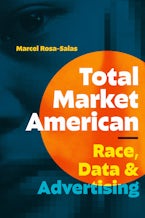In Total Market American, Marcel Rosa-Salas explores how US advertising reinforces racial categories for profit. Through ethnographic research at advertising agencies and key industry events, Rosa-Salas highlights advertising strategy as an influential commercial arena for racial theorizing closely linked to the forms of racial knowledge prevalent in government, academia, and business. Central to her analysis is what she calls the industry’s “racial information system”—a network of practices, personnel, and technologies that institutionalize racial classification as both a predictive and persuasive tool with the aim of influencing consumer behaviors among Hispanic, Asian, and Black Americans. Within this information system, the “general market" is implicitly defined as both white and the average American while other racialized groups are classified as a “multicultural market" that sustains white normativity and monetizes racial difference. Amid demographic shifts, some brands claim to champion racial inclusivity through the rise of “total market” strategies, but Rosa-Salas shows that these techniques actually perpetuate a legacy of racial distinctions in US advertising, including within the classification algorithms that drive digital advertising and surveillance.
Introduction. The American Advertising Industry’s Racial Information System 1
1. “The General Market”: On the Commercial Construction of American Whiteness
2. Multicultural Strategy and the Production of Racial Expertise
3. Reaching “Verified Hispanics”: The Racial Science of Digital Advertising
4. The Total Market Turn: US Census Projections and Making the New Mainstream Consumer
Conclusion. Intersectionality, Inc.: Anti-Racism as Consumer Fantasy
Acknowledgments
Notes
Bibliography
Index

